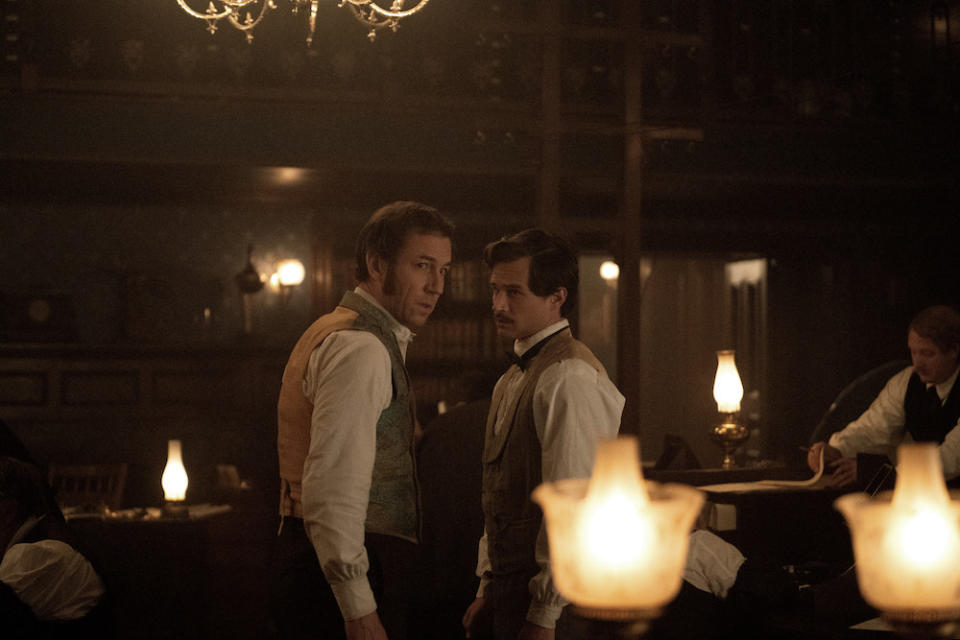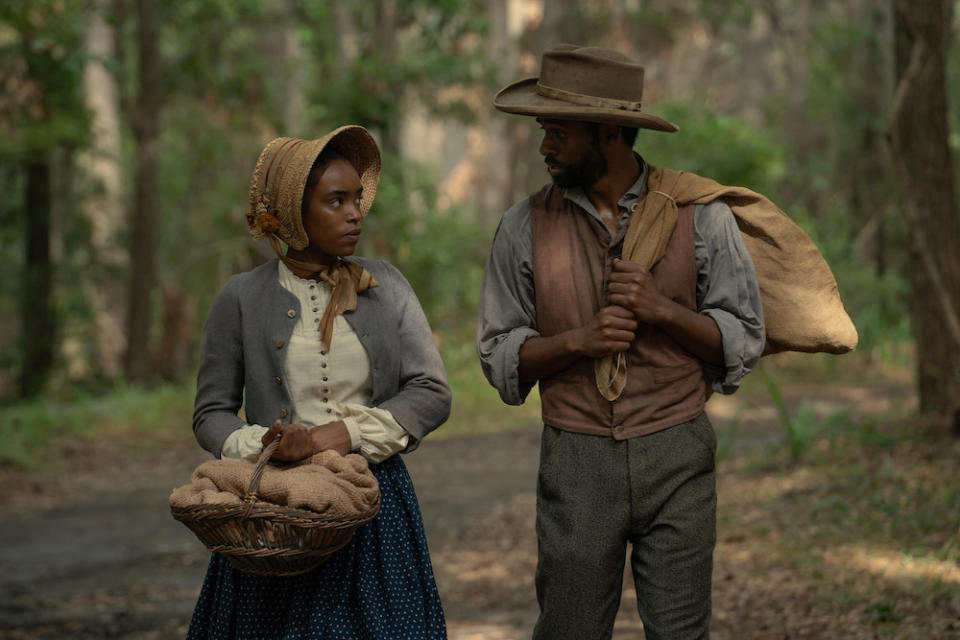‘Manhunt’ Is the ‘Lincoln’ Sequel You May Not Know You Needed

- Oops!Something went wrong.Please try again later.
- Oops!Something went wrong.Please try again later.
- Oops!Something went wrong.Please try again later.
- Oops!Something went wrong.Please try again later.
When Steven Spielberg’s “Lincoln” was released in the fall of 2012, one of the nagging complaints — for an otherwise heralded film — related to its ending. Namely, it had too many.
Roger Ebert, in his four-star review, succinctly implied the picture should’ve wrapped before President Lincoln’s assassination. Samuel L. Jackson felt similarly, though he didn’t mince words about it. While it would be a stretch to say the contentious closing scenes chronicling Lincoln’s murder cost the film any of its Oscars — including losses in Best Editing, Best Screenplay, Best Director, and Best Picture (at the time, there was simply no stopping “Argo”) — it’s exactly the type of first-thought quibble voters would use as an excuse for choosing their preferred nominee.
More from IndieWire
Hugh Grant Talks Fascism, Bad Sex, and Being Terrified of Kate Winslet for 'The Regime'
The Old Hollywood Connection Between 'Chinatown,' 'Mad Men,' 'New Girl,' and 'Palm Royale'
Though plenty of pundits backed the chosen ending (with many arguments focused on expectations built into the film’s tragic structure, which even Ebert conceded) and “Lincoln’s” sweeping acclaim and staggering box office spoke to its overall appreciation ($275 million for a 150-minute period drama? Martin Scorsese would kill a flower moon for that today), very few people were begging for more. Another act? A sequel? No, no, we’re good, thanks.
And yet in its waning hours, the peak TV era has provided just that: an epilogue for “Lincoln,” and — while lacking by most metrics — one better attuned to the American temperament, threats to democracy, and palpable tension of the last eight years.
Whereas “Lincoln” was released in the run-up to Barack Obama’s assured reelection to the presidency, “Manhunt” arrives as a weary country readies itself for an unknowable (potentially disastrous) outcome. To say American citizens have skewed toward cynicism since 2016 would be an understatement, which makes it all the more remarkable that “Lincoln’s” rah-rah depiction of democracy in action still resonates so fully. The film, written by titan of theatrical oratory Tony Kushner, hones in on Lincoln the lawyer; a man whose exceptional understanding of both politics and law have positioned him as just the right person at just the right moment in time to enact vital, monumental change.
With his right hand, Lincoln pushes his party of power players into action, hustling and bustling through Washington D.C. to get the votes required to ratify the Thirteenth Amendment. With his left hand, he points to the laws guiding his decisions, outlining what’s open to interpretation and what’s there, in plain writing, for all to see. His mind, demeanor, and voice are those of an attorney, and what’s fun, funny, and invigorating about “Lincoln” comes from its roots in courtroom drama. That its climactic trial is held on the floor of the United States Capitol doesn’t change its identity, and all the better explains why impatient audiences were quick to object over an ending that felt outside the bounds of the genre they’d been enjoying.
Picking up in the same spot, on the day of Lincoln’s assassination, “Manhunt” suffers a similarly befuddling start. Creator Monica Beletsky (who wrote or co-wrote each of the seven scripts) trusts the audience is up on their American history, as the premiere launches right into the Confederate plot to overthrow the American government. Ah look, there’s Lewis Powell, (Spencer Treat Clark), bum-rushing the Secretary of State’s house with a faulty pistol. And yup, that’s George Atzerodt (Tommie Turvey) getting a gun at Vice President Johnson’s hotel courtesy of John Wilkes Booth (Anthony Boyle) himself. Mounting tension and the resulting chaos carry the action, as the assassins build up the nerve to pull their triggers (or, in Atzerodt’s case, not so much) and the surviving government officials, led by Secretary of War Edwin Stanton (Tobias Menzies), piece together the dastardly plot.

Even with illuminating (but still annoying) time jumps, all this would be much easier to track if “Manhunt” wasn’t so muddled. The visuals succumb to the shadows, which may be period appropriate — rooms are lit by a combination of gaslamps and sparse electricity — but don’t help to distinguish a slew of unfamiliar middle-aged white guys bathed in sickly shades of yellow and brown. Historical dramas don’t have to be ugly, and whil it’s unfair to compare the visual palettes of a modest limited series made on a TV schedule to a studio-backed feature film that capitalized on Spielberg’s pedigree, the end results makes a huge difference. “Lincoln” respected the low-lit conditions of 1865 while casting its A-list cast of extremely famous actors (from Tommy Lee Jones to Hal Holbrook) and identifiable “that guy!”‘s (“Hey, I know that guy! It’s… it’s… Bill Camp!”) in a soft, white glow as often as possible.
Spielberg and cinematographer Janusz Kaminski also had the advantage of telling a ghost story, relying on the script’s Shakespearean influences and Lincoln’s larger-than-life aura to bath scenes in the bright haze of history. “Manhunt,” much to its benefit, doesn’t want to live in the past. Its story is aimed squarely at the present, even if it takes too long to acknowledge as much.
Rather than lingering on Lincoln’s death, “Manhunt” dwells on the instability it escalates. The Civil War has just ended. Divisions among the re-United States run deep. Reconstruction is about to roll out, except instead of being led by a man as forward-thinking as he was kind, there’s an old-fashioned, slave-loving, plantation-defending president in the White House. Andrew Johnson (Glenn Morshower) humors Stanton, our main protagonist, for a bit, but goes back on his word in Episode 3, “Let the Sheep Flee,” when he pardons most Confederate leaders. His decision prompts George Sanders (Anthony Marble), who Stanton quickly concludes organized Lincoln’s assassination as well as the attempts on Seward and Johnson, to tell his fellow domestic terrorists they now have “a second chance … to restore the slave trade.”
Suddenly, our Secretary of War is fighting on three fronts. He has to curb the new president’s worst instincts in order to protect Lincoln’s plans for Reconstruction. He has to build a case to prove Confederate rebels conspired to overthrow the U.S. government. And, oh yeah, he has to catch Lincoln’s killer. That’s plenty of shaky ground to cover in a seven-episode limited series, and while “Manhunt” does too much time-hopping, it largely keeps the personal and public divisions front of mind. Times are hard. Little is clear, and nearly everyone is adrift.
Stanton is split not only among his entanglement of professional duties, but by his commitment to serving America and his quickly depleting his health. Mary (Lovie Simone), a former slave working for Dr. Mudd (Matt Walsh), is torn between doing what’s right (ratting out her boss for harboring and assisting a known fugitive) and protecting herself. (In Episode 3, she’s given a plot of land to call her own as part of Lincoln’s Reconstruction plans, but historians know how that works out for her.) Lincoln (Hamish Linklater) looms large over the period as a symbol, an ideal, via the plan he put in place, but he’s only alive in flashbacks, offering guidance through memories. Even his killer, Booth, lives in a state of delusion. He’s convinced he’ll be welcomed as a hero once he reaches his Southern brethren, and even dreams of being sworn in as the second president of the Confederate States of America.
But the series also insists Booth’s dream wasn’t far from becoming a reality. Whereas “Lincoln” depicts the 16th President completing his greatest feat in the nick of time, “Manhunt” emphasizes just how fractured the country remained following his death — and how Confederate indignation was allowed to fester in his absence. Maybe long after. Maybe to this day.
Without getting into spoilers (although this is a show based on history), Mary’s arc (which, at the onset, feels extraneous) becomes so integral to “Manhunt’s” message about the roots of America’s moral rot it very well could have supported its own show. The bitterness embodied by Booth comprises more than just one jilted white boy’s burgeoning jealousy. President Johnson’s regressive agenda is driven by a far too common contention that Americans aren’t ready for change, though his unspoken belief is even worse: We shouldn’t have to change in the first place.

“Manhunt” is far from a perfect show. It starts slow, gets to its point slower, and struggles to overcome its sludgy palette — not to mention a badly miscast Hamish Linklater. His flickering, oddly Southern twang lines up about as well with Daniel Day-Lewis’ Lincoln as a script that has the formidable attorney listening to legal strategy sessions like a witless client. But the longer I sat with Lincolnlater, the clearer his thankless role became: He’s not trying to meet our expectations but to upend them. This isn’t a Lincoln who should fit snugly with the fatherly image painted across history. He needs to be noticed, scrutinized, even dismissed, so that we can look past his triumphs to the work he didn’t get to complete. Rather than preserve a halcyon image of the past, where the wars won make for a happy ending, “Manhunt” wants to address the mess that was left behind.
The title of Episode 3 comes from something Lincoln says when arguing with Stanton over Reconstruction plans. Eager to move toward reunification, the president argues they should allow Confederate leaders to escape to Europe, rather than worry about arrests, prosecutions, and further punishments. “Isn’t that what the war is for?” he says. “Let the sheep flee.” This position comes up in “Lincoln,” as well, when Honest Abe is talking to General Grant (Jared Harris) shortly before Jefferson Davis surrenders. “No punishment. I don’t want that,” Lincoln says. “And the leaders — Jeff and the rest of ’em — if they escape, leave the country while my back’s turned, that wouldn’t upset me none.” Grant merely nods along, but the Stanton in “Manhunt” pushes back. “Sheep?” he scoffs. “Wolves, Abe. Do you want to see if wolves flee?”
Today, we have our answer. As frustrating as “Manhunt” can be, especially next to “Lincoln,” it knew this story wasn’t over, even if we wanted it to be.
Best of IndieWire
Sign up for Indiewire's Newsletter. For the latest news, follow us on Facebook, Twitter, and Instagram.

